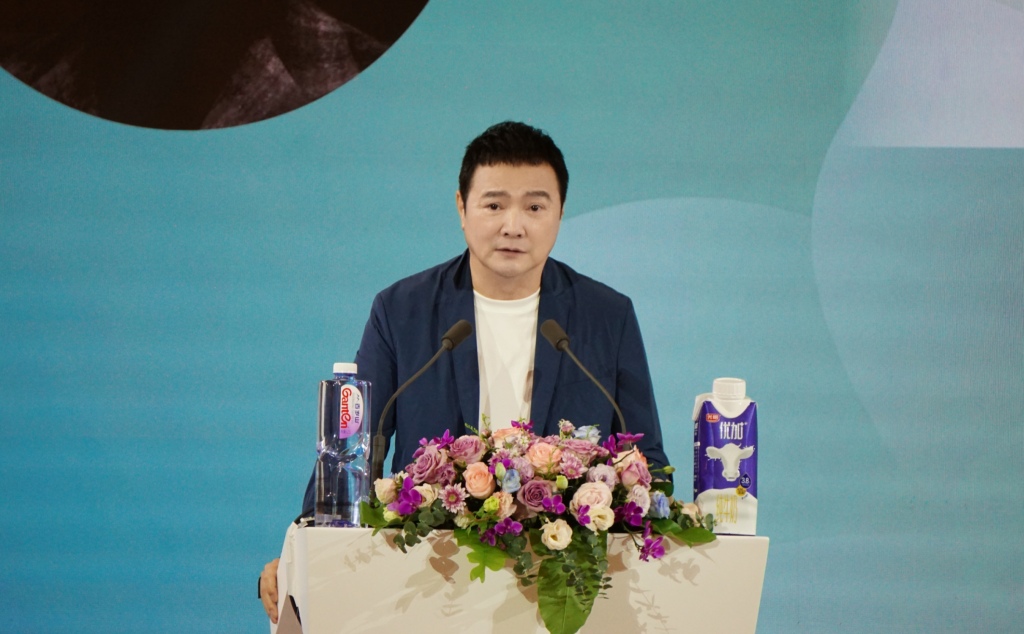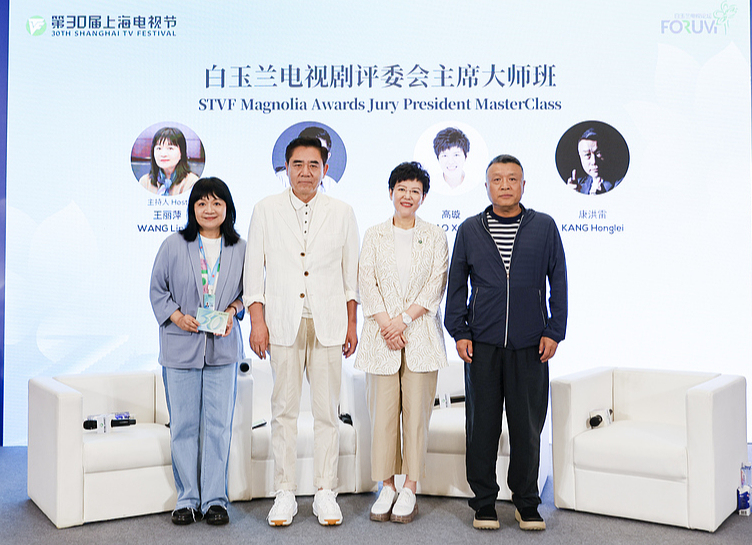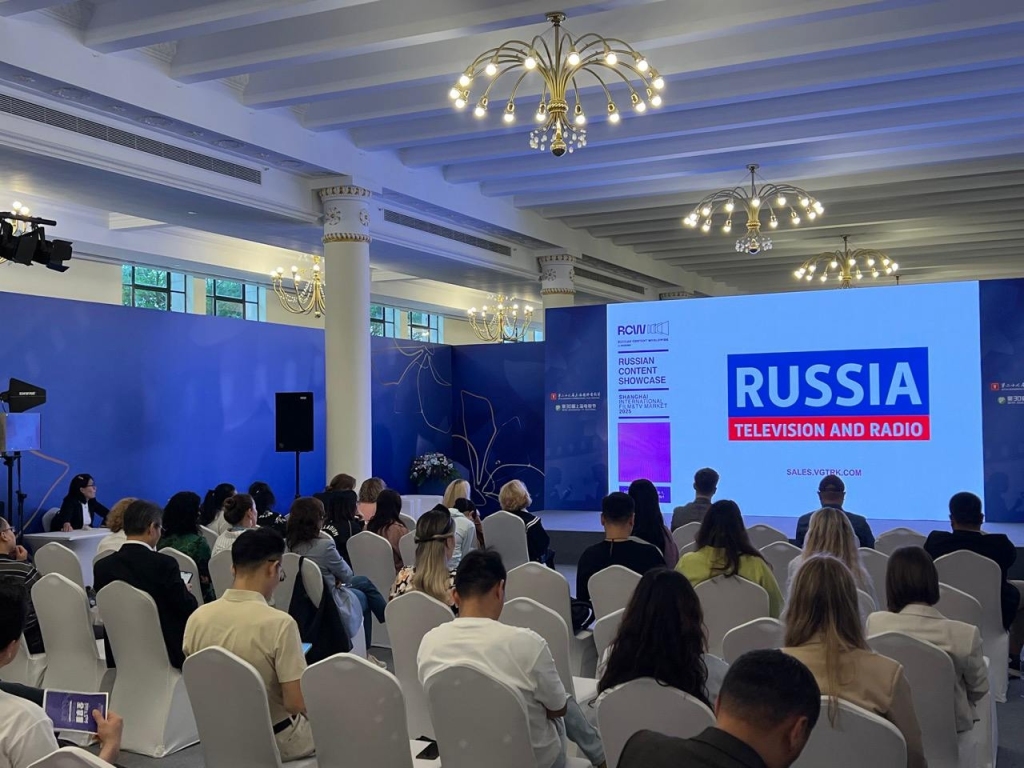
On June 24, the 30th Shanghai TV Festival Magnolia TV Forum "Creation of High-quality Chinese TV Dramas" was held at the Shanghai Exhibition Center.
At the forum, director Wang Jun shared his understanding and practice of the "vitality of quality dramas". He talked about "A Good Life", which he directed and had just concluded not long ago and had both good reputation and popularity. He also touched on hot topics such as the debate between long and short dramas.
Wang Jun has directed many excellent works such as "Little Joy", "Ruyi's Royal Love in the Palace" and "The Story of Rose". Just one day before the forum, he was officially announced as the director of the Mao Dun Literature Award-winning drama "A Thousand Miles of Rivers and Mountains".

Director Wang Jun speaks at the forum. Photo by Cheng Yu, a reporter from The Paper
Wang Jun said that "A Pretty Good Life" is a genuine Shanghai-produced TV series, which clearly reflects the Shanghai culture from the production process to the content expression. With a realistic approach, it shows the various forms and atmospheres of life in Shanghai through the lens, portrays one deeply rooted character after another, and continues to write the survival samples of ordinary people in the contemporary era from all-round and multi-perspective perspectives.
Talking about the good performance of the drama, he said that "A Good Life" has set a new record for CCTV's broadcasts in recent years with a peak viewership of 2.17% per episode. It quickly gained a popularity value of over 10,000 on Youku on the Internet. "Such a result is our ultimate pursuit of high-quality creation and our constant exploration of innovation."

"A Good Life" ratings
Sometimes it is watered down and shoddy, driving away the audience
In the initial stage of the play's creation, considering the rise of short plays and micro short plays, "we made some corresponding adjustments and changes in the creation". In the script creation stage, "strengthen the plot density, enhance the dramatic tension, and speed up the rhythm of the drama". Wang Jun believes that the long drama and long video industry has developed to this day, even if short plays and short videos do not dominate the industry, it is still facing bottlenecks and development difficulties. "There is really no need to blame others for the rise of short videos and micro short plays. We need to do some self-examination."
He pointed out the problems in the creation of these long videos without hesitation: "Long videos are too long. When I say 'long', I don't mean the length, but the water injection, slow rhythm, and shoddy production. Sometimes it is really not the short videos or micro-short dramas that draw the audience away, but we drive them away. This is indeed something we need to reflect on."
Wang Jun emphasized that during the script creation stage of "A Good Life", the density of the plot was strengthened to make it "full of practical content". In the selection of each unit story, based on the reality of life, "it emphasizes its novelty, specificity, and anti-conventional and anti-routine". He talked about the process of polishing the script, "When I first got the script, each story was a bit mediocre. We went to real life with the screenwriter, did some research in the insurance industry, and collected a lot of new materials. In the end, the script presented to the audience was greatly changed from the first script I came into contact with."

Stills from "A Good Life"
Talking about the rhythm, the drama makes the heroine suffer a double blow from the change of marriage and career from the beginning, which greatly strengthens the tension of the drama. "She decided to climb up from the double trough of life and regroup. It only took two and a half episodes in length. From discovering her husband's infidelity to divorce, to career hammer, to being framed, we only took two and a half episodes. This can be expanded to at least 4 to 5 episodes in a general TV series, but we completed it in two and a half episodes." Wang Jun emphasized, "In terms of rhythm, make it tighter and more impactful. Don't tell a story leisurely. Now you can't be leisurely, now you can't tell it leisurely, and let the audience give him satisfaction in terms of emotional value at once. Fast pace, high plot density, and strong dramatic tension are not the patents of short dramas and micro short dramas. We deliberately strengthen these characteristics in the creative process to better adapt to the rapidly changing appreciation needs of modern audiences."
Flaws are the reason why there is the saying "Who doesn't love Hu Manli"
On the other hand, he also discussed in depth with the lead actress Sun Li the flaws and weaknesses of the core character of the play, Hu Manli. "Compared to short plays and short videos, where the characters are flat and stereotyped, we emphasize complexity, multi-facetedness and growth in character portrayal. Our male and female protagonists are both imperfect and have grayscale. When we discussed the characters, Sun Li and I carefully sorted out the flaws, weaknesses and defects of the heroine and made some bold (designs)."
Long dramas are able to show the depth and richness of characters in a way that short dramas cannot. "Our male and female protagonists emphasize the arc of character growth, widening the gap between the starting point and the end point of the character growth line. This is the highlight of our character creation. Because the characters are imperfect and have flaws, they are more real and vivid, which makes the audience like them more and more, which is why there is the phrase 'Who doesn't love Hu Manli'."

"Who doesn't love Hu Manli?"
He also pointed out that "in this TV series with a high 'Shanghai content', we used the camera to integrate the scenes of 86 cultural and tourism landmarks in Shanghai into the plot, showing a comprehensive video diary of Shanghai." Because of the many famous scenes in the series, the Bund, Oriental Pearl Tower and other places have become new check-in points in Shanghai. Wang Jun also noticed that "there are many such photos on the Internet, which has a good effect on promoting Shanghai's cultural tourism. The team has gone deep into the characters, studied and strived for excellence, and equipped them with the most suitable character backgrounds, character personalities, and current costumes and props to show the current urban atmosphere of Shanghai."

Same check-in
An era where long plays and short plays go hand in hand
Talking about the inevitable competition between long and short dramas, Wang Jun believes that "now is an era where long and short dramas go hand in hand". He mentioned that he had recently watched a short drama " Home and Away ", and said frankly, "I used to be averse to micro-short dramas. I would turn them off after watching them for a few minutes. But "Home and Away" has absorbed some production techniques of long dramas. This is a stage of mutual tolerance and mutual learning, rather than mutual exclusion and competition."
Now is an era of massive information technology and audience-dominated viewing relationships. Wang Jun said, "Creators should always strive to find the greatest common denominator with the audience in terms of aesthetic preferences and interests. The audience's patience in following long dramas is decreasing, and it is becoming increasingly difficult to find the common denominator. The accuracy of the common denominator is becoming increasingly vague. Long dramas need to change, but what exactly should be changed? This is the most worthy question for us creators to think about."
But he also has his own persistence, "What can be changed and what cannot be changed, the things that cannot be changed cannot be changed, that is, we must persist and stick to it. Only when we creators always put content first, treat it sincerely, and get close to the audience, can we give full play to the permanent vitality of long dramas. I think we should not be discouraged and should not scare ourselves. There will definitely be a market for long dramas because they are irreplaceable. I believe that the vitality of long dramas will be very long."


